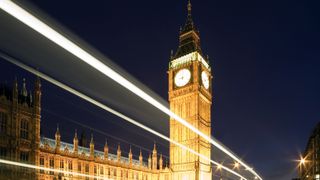BT to enter 4G fray as Vodafone wins big in superfast auction
As in superfast speeds, not that it was done quickly

The always-riveting 4G spectrum allocation has been completed in the UK, and it seems most firms got something they wanted.
The auction, which has been running from the tail end of last year but has been under negotiation for years, sees the combined total for the HM Government tip 'only' £2.3bn, rather than the £3.5bn George Osborne was looking for.
Vodafone put up the most cash after an exhausting 50 rounds of bidding, spending £790m to gain 85MHz of both the long-range 800MHz frequency and the more city-friendly 2.6GHz spectrum.
Vodafone UK chief executive Guy Laurence confirmed the network had gone after such a range of spectrum to allow it to penetrate more areas: "[The 4G auction results] will enable us to deliver services where people really want it, especially indoors… the next generation of mobile internet services will bring real benefits to both consumers and businesses."
Bring on BT
BT was the winner out of the three new candidates, through its Niche Spectrum Ventures, but this will very likely be for pumping out broadband to the harder-to-reach places in Britain, as the network told TechRadar last year.
Intriguingly, BT only got spectrum in the 2.6GHz band, which is touted as being less able to spread widely, but that certainly doesn't rule out being able to supply rural broadband, so it will be interesting to see how the company brings 4G to its market.
O2 was the big surprise in the auction results, as while it got a good chunk of the sought-after 800MHz range, it only got 20MHz. We've polled the network to see how this fits into its plans given major rival Vodafone has got plenty more MHz, but at least the bubbly provider only paid £550m for the privilege.
Get daily insight, inspiration and deals in your inbox
Get the hottest deals available in your inbox plus news, reviews, opinion, analysis and more from the TechRadar team.
Three was widely believed to be missing out on the 800MHz band, especially as it already has bought some spectrum from EE last year as part of the deal to allow the combined Orange and T-Mobile brand to deploy 4G in the UK early. However, Three picked up 10MHz in the longer range space, but still paid £225m.
EE opens its pockets again
And of course EE was in there too, chucking £588m into the pot to gain even more spectrum at both the 800MHz and 2.6GHz bands – perhaps that will see the supplier lowering prices to compete with Three's pledge to not increase any prices when it brings 4G live in the summer.
The auction isn't over yet though. We still have a round of bidding for each winner to decide where in the spectrum their allocation will sit, as this can have effects on cost-efficiency and coverage.
And spare a thought for the likes of MLL Telecom Ltd and HKT (UK) Company Ltd – both lost out in the auction and won't get to see that £100,000 non-refundable deposit again.
Ofcom has stated that it believes this auction will lead to more price drops in the mobile broadband space, and will see almost blanket coverage of 4G in the UK by 2017.
The networks will also have to pay up for their auction wins by February 22. So if a man in a Vodafone suit pops round asking to borrow a tenner, at least you'll know why.

Gareth has been part of the consumer technology world in a career spanning three decades. He started life as a staff writer on the fledgling TechRadar, and has grown with the site (primarily as phones, tablets and wearables editor) until becoming Global Editor in Chief in 2018. Gareth has written over 4,000 articles for TechRadar, has contributed expert insight to a number of other publications, chaired panels on zeitgeist technologies, presented at the Gadget Show Live as well as representing the brand on TV and radio for multiple channels including Sky, BBC, ITV and Al-Jazeera. Passionate about fitness, he can bore anyone rigid about stress management, sleep tracking, heart rate variance as well as bemoaning something about the latest iPhone, Galaxy or OLED TV.
